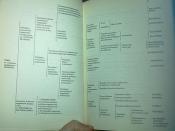Thomas Hobbes and Jeremy Bentham were both legal positivists. In an attempt to solve the problem of interpretation, legal positivists conclude that there is only one way to interpret a law. According to Hobbes' theory of legislation, it is the people who enforce the law that decide what it means. On the other hand, Bentham argues that promulgating the reasons for a law solves the interpretation problem. Both Bentham and Hobbes viewed law somewhat negatively; arguing that the nature of the law is a restraint on liberty. Their two theories differ the most in regards to natural law. In this paper, I will explain both Hobbes' and Bentham's theories of legislation and apply them to the Supreme Court Case Marbury v. Madison.
Hobbes states that "civil law, is to every subject, those rules, which the commonwealth hath commanded him, by word, writing, or other significant sign of the will, to make use of, for the distinction of right and wrong; that is to say, of what is contrary, and what is not contrary to the rule" (Hobbes 173).
Based on this definition, men are obliged to obey civil laws because they are members of a commonwealth. In this definition, Hobbes asserts that law is command, not counsel and that law are the rules of just and unjust. Hobbes insists that any law must be promulgated. In order for one to know how to obey it, a law must be "signified by sufficient signs". Laws must be made known for them to actually be law.
Hobbes argues that the sovereign is legislator and it is he who makes the law. Following from this, Hobbes deduces that the legislator is not subject to civil law. The sovereign alone is the final judge of the law. To imply that the sovereign is bound to a law is just like implying that the sovereign is bound to itself. As Hobbes explains, it is not "possible for any person to be bound to himself; because he that can bind, can release" (Hobbes 173). Hobbes goes on to argue that it is not the length of time that makes a law, but that it is the sovereign's consent that makes law. Nor is it custom that makes law because laws are made by the sovereign power. Hobbes explains this by stating, "the legislator is he, not by whose authority the laws were first made, but by whose authority they now continue to be laws" (Hobbes 175).
In Hobbesian theory, the law of nature can only be known through reason alone and like the law of nature, civil law can never be against reason. "The law of nature is the basis of civil law; they contain each other, and are of equal extent" (Hobbes 174). According to Hobbes, laws of nature are not actual law until a commonwealth is settled. After settlement, they become the law of the commonwealth as well as civil law. It can also be said that, "the civil law is a part of the dictates of nature" (Hobbes 174) His theory describes the unwritten law of nature as "qualities that dispose men to peace and obedience." Thus, a part of the law of nature is also obedience to civil law (Hobbes 174).
Hobbes believes that all laws require judgment and interpretation. That authority lies in the sovereign, not with lawyers, legal scholars, or philosophers. Hobbes shows that intention is law, not the text in saying, "for it is not the letter, but the intendment, or meaning, that is the authentic interpretation of the law" (Hobbes 180). While the sovereign is the final judge, he may appoint subordinate judges to verify the laws he authorizes. According to Hobbes, "verification, is but the testimony and record, not the authority of the law" (Hobbes 179). A subordinate judge cannot authorize or make law; they can only verify law.
Hobbes lays out his idea of a good judge, or interpreter of the laws. To him, an excellent judge is one that has a right understanding of the fundamental law of nature, equity. A good judge must also have the "patience to hear; diligent attention in hearing, and [the] memory to retain, digest, and apply what he hath heard" (Hobbes 185). A good judge must also have the ability to look at cases in an unbiased way. A judge must be impartial, decide equitably, and reach his conclusions through proper exercise of reason. Hobbes acknowledges that even subordinate judges may err in judgment of equity (Hobbes 181).
According to Hobbes' theory, a judge's sentence in a particular case is not binding to him, or to other judges in future like cases. "No man's error becomes his own law; nor obliges him to persist in it. Neither becomes it a law to other judges" (Hobbes 181). Therefore, a judge is not obliged to give the same sentence in like cases. "Their sentences are to be taken by them that pled, for laws in that particular case; but not to bind other judges, in like cases to give like judgments" (Hobbes 183). Thus, the sentence of a judge is only law to the party pleading.
Hobbes classifies laws as either natural or positive. Natural laws "are those which have been laws from all eternity" (Hobbes 186). Natural laws are also called moral laws or the laws of nature. Positive laws are those that "have been made laws by the will [of the sovereign]; and are either written, or made known to men" (Hobbes186). Positive laws are then divided into two classes: divine, being God's commands, and human laws. Human laws are either distributive or penal. Distributive human laws are "those that determine the rights of the subjects" and penal are those "which declare what penalty shall be inflicted on those that violate the law" (Hobbes 186). In Hobbes' theory, there is also another distinction of laws: fundamental and not fundamental. "A fundamental law is that, by which subjects are bound to uphold whatsoever power is given to the sovereign" (Hobbes 188). Not fundamental laws are those "concerning controversies between [subjects]" (Hobbes 189). Hobbes defines the difference between law and right, stating that "right is liberty, namely that liberty which the civil law leaves, but civil law is an obligation, and takes away from us the liberty which the law of nature gave us" (Hobbes 189). Jeremy Bentham's theory of legislation has a different definition of rights and obligations.
In Bentham's theory of legislation, "the sole object of government ought to be the greatest happiness of the greatest possible number of the community" (Bentham 3). He asserts that civil law can be divided into two classes: rights and obligations. Rights are "advantages; benefits for him who enjoys them", while obligations are "duties; burthensome charges for him who has to fulfill them" (Bentham 2). Bentham argues that legislators should follow the principal of utility and establish laws in order to create the greatest good for the greatest number. "In accordance with the principal of utility, [the legislator] ought never to impose a burthen but that he may confer a benefit of greater value" (Bentham 2). Bentham believes that the law inevitably curtails liberty. Thus, the law can "neither command nor prohibit, without restraining the liberty of individuals" (Bentham 3). In order for a citizen to have a right, he must forfeit a part of his liberty.
Bentham describes four distinct functions of the law: "to provide for subsistence; to secure abundance; to befriend equality, and to maintain security" (Bentham 4). According to Bentham, security it the most important object in legislation. "Security is the only [function] which necessarily embraces the future" (Bentham 4). Bentham argues that "without law there is no security; consequently no abundance, nor even certain subsistence. And the only equality which can exist in such condition, is the equality of misery" (Bentham 14). By saying this, Bentham is arguing that all of the distinct objects of civil law are habitually united and dependent upon each other.
In addressing the power of law over expectation, Bentham argues that the legislator is an interpreter and a servant to the people. According to him, a good law conforms to the general expectation. The legislator must "understand the direction of expectation, for the purpose of acting in concert with it" (Bentham 41). In order to conform to the general expectation, certain conditions are required. Bentham lays out seven specific conditions in his theory of legislation.
Bentham argues, "the laws may be anterior to the formation of the expectation" (Bentham 41). Every law does not need to meet expectation. It is possible to create a new law and change expectation. The legislator should also "let the laws be known" (Bentham 42). If the people do not know a law, it cannot effect expectation. A law needs to be clear about what it is and it must be easily understood what the law is trying to do. Bentham's third condition is that "the laws should be consistent with themselves" (Bentham 43). Because it stems from reason, all law should fit together. Bentham goes on to state "it is only possible to make laws truly consistent, by following the principles of utility" (Bentham 44). There also should be "method in the laws", meaning "both the style and arrangement ought to be simple. The law should be a manual of instruction for every individual, and he ought to be able to consult it, under all his doubts, without requiring an interpreter." Another necessary condition is that "the law should be present to the mind as about to be executed" (Bentham 44). The final condition for controlling expectation is, "that the laws should be literally understood" (Bentham 46).
Bentham asserts that, "good laws are those for which good reasons are assignable." He goes on to say that "a comparative balance for and against [a good law] is desirable" (Bentham 6). Bentham believes that laws should include a promulgation of reasons. Explaining the reasons would allow the law to be more easily understood. In promulgating the reason of the law, there is no skepticism as to the real intention of the legislator. "The reasons themselves would serve as a kind of guide in cases in which the law was unknown" (Bentham 9). Bentham argues that exhibiting the reasons for a law would leave only one interpretation. Thus, judges would not make false interpretations, "unintentional errors would become almost impossible", and "the citizens would judge the judges" (Bentham 10). According to Bentham, the main goal of the law is "the preventing of individuals from pursuing their own happiness, by the destruction of a greater portion of the happiness of others" (Bentham 13). Therefore, the legislator must demonstrate that a law is conformable to the principal of utility; in order to do so, a reason must be given to every law. Bentham and Hobbes have different theories of legislation. Thus, they would view court decisions in different ways.
According to Hobbes' theory of legislation, the law is the intention of the legislator. In regards to Marbury v. Madison I think Hobbes would react to the fact that the judiciary is the one making law. Justice Marshall stated in his opinion that "it is emphatically the province and duty of the judicial department to say what the law is". Hobbes would disagree with this statement. It is the job of the legislature to say what law is. In this case, Marshall is making law by establishing the principal of judicial review. Judicial Review is "the power of the Court not only to interpret the constitutionality of a law or statute but also to carry out the process and enforce its decision" (Wikipedia.com). Hobbes' theory portrays a clear role of the legislative and executive branches; the legislature makes laws and the executive enforces the laws. The doctrine of judicial review goes against Hobbesian theory. Hobbes' theory also states that judges should decide cases based on equity and the evidence in each particular case. I think Hobbes would view Marshall's opinion inequitable.
On the other hand, Bentham believes that every decision should be based on its possible consequences. In the case of Marbury v. Madison, Marshall believed that as a judge he could never take into account the consequences of his opinion when deciding cases. Bentham would disagree with this. According to his theory, the promulgation of reasons "would be a compass for judges" (Bentham 9). He goes on to argue that stating the reasons for a law would enable the citizens to judge the judges (Bentham10). I think that Bentham would praise Chief Justice Marshall for commenting on the reasons behind his opinion. Marshall opined that The Judiciary Act of 1789, permitting the Supreme Court of the United States to issue a writ of mandamus, is unconstitutional. Marshall goes on to state the reason for his decision; the Constitution is the supreme law of the land. Since The Judiciary Act contradicts the Constitution, it is the Constitution that is supreme. This is a very strong reason for Marshall's decision and as Bentham states, "the strength of the reason will become the strength of the law" (Bentham 10). Because Marshall exhibited of the strong reasoning behind the law, the power of judicial review is still prominent in American society.
If I had to recommend either Hobbes' or Bentham's theory to a legislator as a guide to how law should be made, I would recommend Bentham's theory of Legislation. When it comes to the role of the judiciary, Hobbes' theory can be ambiguous and contradictive. Overall, his theory does not explain what exactly a law is. Hobbes' theory gives absolute authority to an unaccountable sovereign. On the other hand, Bentham gives a straightforward, future-oriented theory of legislation. I agree with him that legislators need to be careful in every law that they frame. Bentham argues that security is the most important aspect of civil law; I agree with him. Citizens need some form of security against the government. If you were to follow Hobbes' theory of an unaccountable sovereign, there would be no security from the government. I think that legislators try too hard to meet citizens' expectations and according to Bentham every law does not need to meet the general expectation. Bentham's theory of legislation does not require an interpreter of the law. It is the interpretation of the law that gives the judiciary too much power, and essentially, the power to make laws. While Hobbes' theory of legislation is similar to Bentham's, I do not believe that it is the best guide to how law should be made. There should be nothing ambiguous about law making. People deserve to know the reasons behind a law and Bentham requires that, I think more people would obey the law if they understood why is what enacted in the first place.
Both Hobbes and Bentham attempted to solve the problem of interpretation; concluding that there is only one way to interpret a law. Bentham argues that promulgating the reasons for a law solves the interpretation problem. In Hobbes' theory of legislation, he claims it is the people who enforce the law that decide what it means. While they were both legal positivists, their theories differed greatly in regards to natural law. I would recommend Bentham's theory to a legislator because it is more easily understood and less ambiguous than Hobbes' theory of legislation.
BibliographyBentham, Jeremy, "An Introduction to the Principles of Morals and Legislation",The Works of Jeremy Bentham, vol. 1, Bowring, John, ed.
(Edinburgh: Simpkin, Marshall, & Co., 1843), pp. 1-154.
Hobbes, Thomas, "Leviathan





